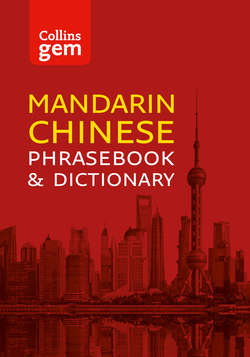Читать книгу Collins Gem - Collins Dictionaries - Страница 7
ОглавлениеPronouncing Mandarin
It is not easy for foreigners to pronounce Mandarin Chinese, so in this phrasebook we have used standard Latin phonetic sounds to keep it simple. Mandarin is not written using an alphabet, but by various strokes (such as , ). Written Chinese is based on these ‘characters’ rather than words. The standard Mandarin Chinese pronunciation system (called ‘pinyin’) is based on consonants and vowels which look just like English words. By converting a pinyin character (each representing the sound of the Chinese character) into the standard Latin phonetic sound, English/European language speakers will be able to pronounce pinyin easily.
The system of conversion is as follows:
| Consonants | ||
| Pinyin | Phonetic sound | Converting example |
| b, d, f, g, j, l, m, n, p, s, t, w, y | pronounced the same as in English | băo→bao(宝, treasure) |
| c | similar to ts in boots | cí→tsi(词, word/s) |
| h | similar to ch in Scottish loch | hē→he(喝, to drink) |
| q | similar to ch in chip | qīng→ching(清, clear) |
| r | similar to r in red | rén→ren(人, person/people) |
| x | similar to sh in she | xī→she(西, west) |
| z | like ds in kids | zāi→dsai(灾, disaster) |
| zh | like j in joke | zhōng→jong(中, middle) |
| Vowels | ||
| Pinyin | Phonetic sound | Converting example |
| a | like a in Zara | mā→ma(妈, mum) |
| e | like e in her without the sound of r | hē→he(喝, to drink) |
| i | like ee in bee | mĭ→mi(米, rice) |
| o | like the sound of war | wŏ→war(我, I/me) |
| u | like oo in spoon | lù→loo(路, road) |
| ü | like the sound of letter u , followed by ee in bee | ǜ→chu-ee(去, to go) |
| ai | like the sound of I | ài→l(爱, love) |
| ei | like the sound of letter a | mĕi→may(美, beautiful) |
| ao | like ou in ouch | lăo→lou(老, old) |
Intonation
There are five tones used when pronouncing Mandarin; to make it easier for you to remember them, we have placed the diacritics on top of the vowel in each pinyin to indicate the flat tone (—), the rising tone (´), the musical long tone (˘), the strong tone (`), whilst no diacritic means a quiet tone.
In order to make it easier for you to understand these tones, the following examples are supplied. These will give you some idea of how to pronounce the four basic tones in Mandarin:
| Mandarin pinyin | English sounds |
| mā | pronounced like ‘ma’ in the first syllable of ‘marmalade’ |
| má | pronounced like ‘ma’ in ‘mass’ but with a slightly rising tone |
| mă | pronounced like ‘mar’ in ‘marquee’ but holding this sound for slightly longer |
| mà | pronounced like ‘mar’ in the first syllable of ‘marmalade’ |
